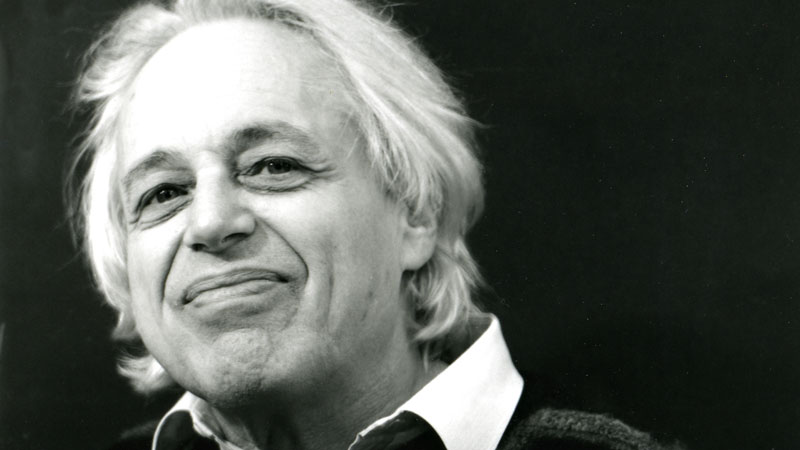léonie sonning music prize 1990
The Hungarian composer György Ligeti received the Léonie Sonning Music Prize of 200,000 Danish kroner during a concert at the Aarhus Music House on 29 April 1990. The event was also constituted the closing concert of the NUMUS Festival for New Music. The concert was broadcast live on the Danish Broadcasting Corporation’s P2 radio channel.
The prize was presented by the Danish Broadcasting Corporation’s former Head of Music Mogens Anderson, who in his speech remarked that Ligeti was neither consulted nor paid when his music was used in the film 2001: A Space Odyssey. ‘It says something about the position of the creative musician in the age of mass-produced culture. But perhaps this prize can be seen as an installment on that payment on behalf of the cultural community.’
citation
The Léonie Sonning Music Prize is presented to the composer György Ligeti in recognition of his constant renewing of forms of musical expression, an act that has had a decisive impact on the course of music history. His works have inspired performing musicians like few others, and resonated with increasing audiences though their elementary expressive power.’
The programme
György Ligeti Clocks and Clouds (1972-73)
György Ligeti Concerto for Piano and Orchestra (1985-88)
György Ligeti Concerto for Cello and Orchestra (1966)
György Ligeti San Francisco Polyphony (1973-74)
Soloists:
Erling Bløndal Bengtsson, cello
Volker Banfield, piano
Aarhus Symphony Orchestra
Conductor: Elgar Howarth
György Ligeti and Denmark
Ligeti visited Denmark for the first time in 1965, when the Aarhus Symphony Orchestra played his then-new orchestral work Apparitions. The following year, the Danish National Symphony Orchestra also performed Apparitions, together with the work Atmosphères, at a radio broadcast subscription concert. The orchestra continued with many more performances of Ligeti’s music in the years that followed. In 1979 Ligeti lectured at the conservatories of Aarhus and Copenhagen, and in 1988 he returned to Denmark to give a lecture on his Piano Concerto, which was performed twice in one evening by the Danish National Symphony Orchestra and pianist Volker Banfield, in order to allow the audience to familiarize themselves with the music.
In connection with the prize concert, a number of other performances of Ligeti’s music were arranged. The Polish harpsichordist Elisabeth Chojnacka played the composer’s Continuum, Passacaglia Ungherese and Hungarian Rock. The same evening the Esbjerg Ensemble, conducted by Frans Rasmussen, played Ligeti’s Chamber Concerto, Melodien, Aventures and Nouvelles Aventures. At a third concert Volker Banfield played the composer’s Etudes Nos 1-8.
The daily press wrote, among other things:
That’s the way to do it. That’s how it should be done, every time. The first time the Léonie Sonning Music Prize came to Aarhus, it happened with the most successful Sonning related orchestral concert since Pierre Boulez received the prize in 1985. And it happened with a prize concert itself structured as a series of chamber concerts and lectures, the likes of which has not been seen in in the Sonning festivities since Boulez was in Copenhagen. At the same time it allowed György Ligeti to be part of this year’s NUMUS Festival, the most ambitious edition of the festival yet undertaken and the most artistically successful I have ever experienced.
(Jakob Levinsen, Berlingske Tidende 1 May 1990)
It takes concentration. One literally needs to be all ears. There are no characters in Ligeti’s musical landscapes, no identities to hold onto. It’s about textures and textiles: sonorous, harmonic, melodic, motoric, rhythmic – through which the centre of gravity shines in Ligeti’s sparse works. The whispering cello concerto was the evening’s best example of the composer’s early period, but often the dimensions are intertwined as in Clocks and Clouds, the concert’s first work, where delicate vibrating sound clouds and ticking clocks flow into each other in dreamlike transformations. The infinitely flexible sound, which came off very beautifully here, is rendered with an ingenious stroke of instrumentation around a core of woodwinds and a women’s chorus.
(Jan Jacoby, Politiken, 1 May 1990)
And then Ligeti, who spent some time in Stockholm 20 years ago, gave his thanks in Swedish and spoke about composing. He had neither himself, the musicians nor the audience in mind when he worked, he explained. He was always too excited about the musical idea and the material. The speech of thanks also gave the audience an insight into Ligeti’s works, which seek new expressive boundaries and possibilities. As we experienced in the prize concert, the most complicated thing can, in the end, appear both simple and direct.
(John Christiansen, Jyllands-Posten, 1 May 1990)





